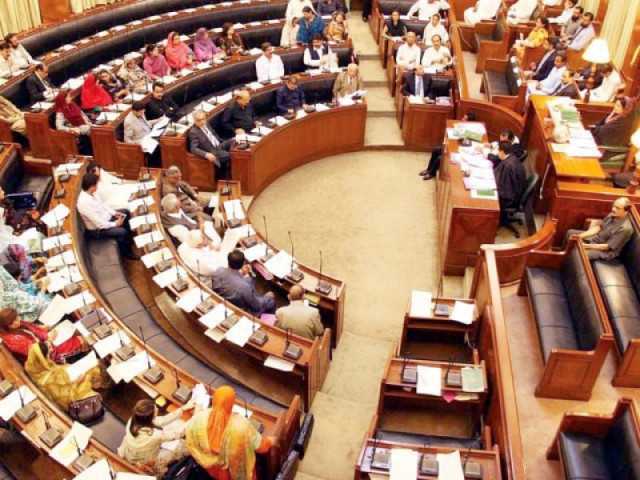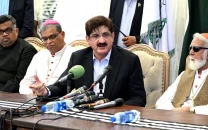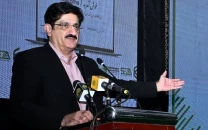Incompetence: ‘A sensible PFC award needed’
Former provincial minister for finance says Commission key issue for Sindh.

PFC has not been revised since 2002, it has lapsed already, and districts allocate resources on the basis of the debarred PFC. PHOTO: FILE
Much is said about the National Finance Commission (NFC), which makes fiscal allocations to provinces by redistributing the divisible pool of resources, such as personal and corporate income tax, general sales tax on goods and customs.
But little attention is paid to the Provincial Finance Commission, a body similar to the NFC, which was constituted in 2001 with an objective of devising a formula for the distribution of resources among the Sindh districts to ensure smooth functioning of local governments and minimise poverty and income inequality.
PFC has not been revised since 2002. It has lapsed already, and districts are allocated resources on the basis of the debarred PFC.
“It’s a key issue for Sindh. Hoping for the sound resource allocation among districts without a new PFC award is useless. Far from being a priority, the PFC issue is hardly part of any discussion in Sindh,” according to former provincial minister for finance, Syed Shabbar Zaidi.
Speaking to The Express Tribune, Zaidi said discretionary spending will keep rising in the province in the absence of an updated PFC award. “A large part of the wasteful and untargeted expenditure carried out in the name of development programme can be eliminated by means of a sensible PFC award,” according to the renowned chartered accountant who serves as partner at AF Ferguson, one of the biggest firms of professional accountants in Pakistan.
As a private-sector professional with a typical cynicism towards government, Zaidi remains vehemently opposed to the so-called development programmes. “If it was up to me, I would simply ban these ADPs,” Zaidi said while referring to the discretionary funds that provincial legislators and chief minister are free to use at whim.
Sindh ADP for the current fiscal year amounts to a massive Rs185 billion. If foreign project assistance and other federal grants are included, total provincial development expenditure for 2013-14 totals Rs229.9 billion.
The provincial development expenditure is about 37.2% of Sindh’s total expenditures for the current fiscal year amounting to Rs617.2 billion.
“A large part of these discretionary funds, meant for so-called development programmes, lapses in many cases. The Sindh government goes on an annual spending spree in the last two months of the fiscal year and even then it is unable to spend the earmarked funds,” Zaidi said.
Data shows Zaidi’s criticism is justified. For example, budget estimates for the last fiscal year show provincial development expenditure was Rs231.1 billion initially. However, the revised estimates presented at the end of the fiscal year show Sindh’s development expenditure was only Rs143.2 billion, down by a massive 38% from the original amount set aside for development programmes.
Revenue collection
There are two major sources of revenue for the provincial government. Transfers from the federal government are estimated to be Rs409 billion while provincial tax and non-tax receipts are expected to be Rs120.1 billion in 2013-14.
If the rest of the revenue sources, such as grants and funding from international financial institutions, are accounted for, total revenues of the province are estimated to be Rs595.5 billion in 2013-14.
“I think the Sindh government will easily achieve its revenue targets. But the reason is not its efficiency. The targets it sets for itself every year are too conservative because people in the government are simply not interested in working hard,” Zaidi said.
Drawing from his brief stint in the provincial government as finance minister, he believes Sindh revenues can be increased up to 400% in a couple of years. “To say that the provincial government doesn’t have the revenue earning capacity is absolutely wrong. The issue is of unwillingness, not lack of capacity,” he said.
Referring to provincial income tax, Zaidi said all provincial governments have shied away from collecting it since its imposition in 2002. Unlike the Sindh Board of Revenue, which was established recently for the collection of sales tax on services, the Sindh government has had no department/office of agriculture income tax for the last 12 years.
“This shows that tax is a purely urban issue in our country,” he added.
Published in The Express Tribune, May 23rd, 2014.
Like Business on Facebook, follow @TribuneBiz on Twitter to stay informed and join in the conversation.



















COMMENTS
Comments are moderated and generally will be posted if they are on-topic and not abusive.
For more information, please see our Comments FAQ